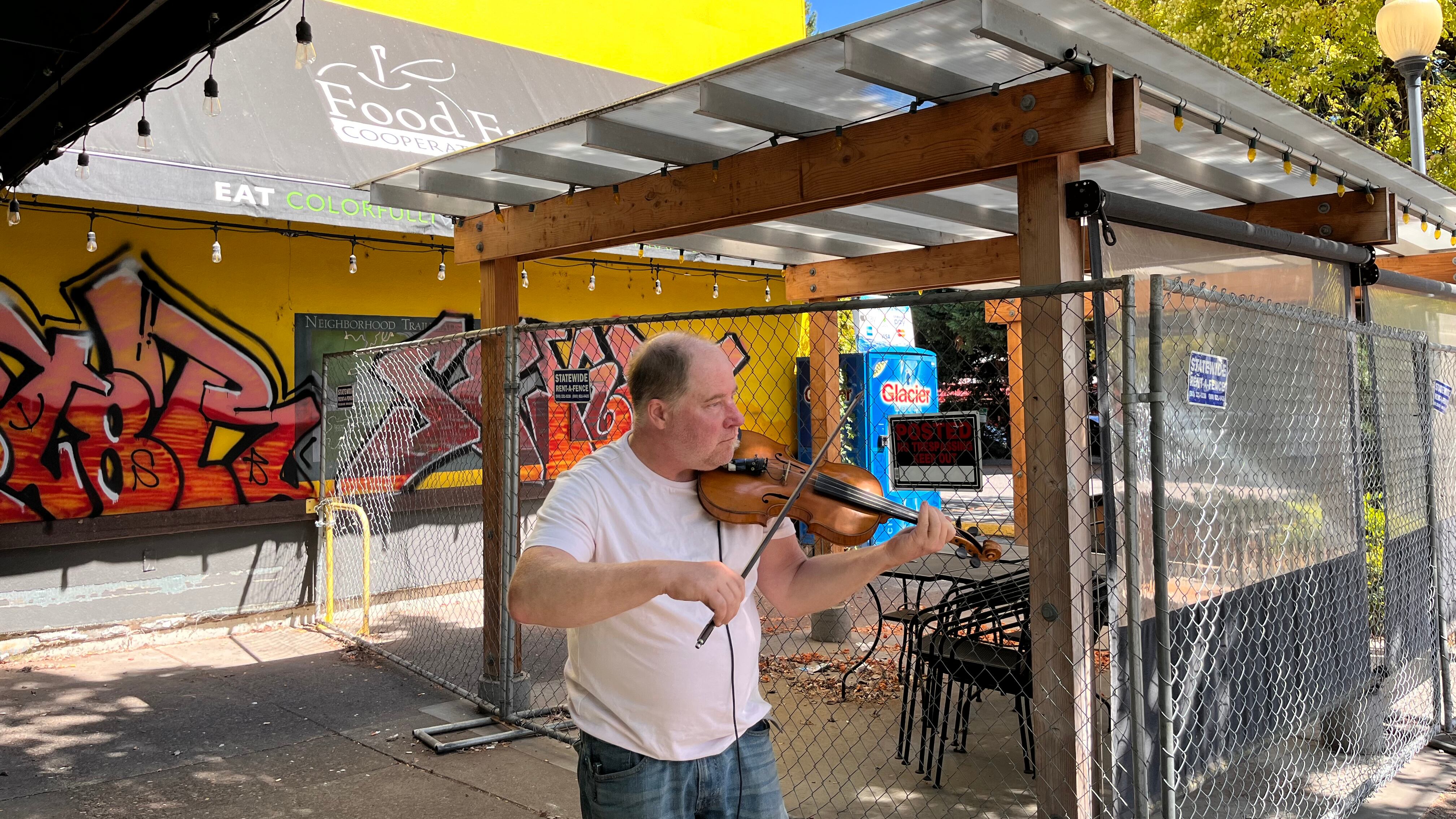ADDRESS: 2375 NW Thurman St.
YEAR BUILT: 1938
SQUARE FOOTAGE: 7,596
MARKET VALUE: $4.5 million
OWNER: The Real Good Food Store Inc.
HOW LONG IT’S BEEN EMPTY: About 4 months
WHY IT’S EMPTY: The co-op couldn’t pay its bills.
On a recent Friday afternoon, a violinist in jeans stood outside the fenced front door of the shuttered grocery co-op Northwest Food Front playing “Simple Gifts,” the poignant Shaker hymn.
Food Front, the beloved grocery co-op in Slabtown that operated for five decades and was favored by the late science fiction writer Ursula K. Le Guin, shuttered in April. It was falling behind on its payments to vendors, bank lenders and tax authorities.
Onlookers note an irony. The co-op is surrounded by multimillion-dollar homes owned by retired doctors and lawyers. And yet even a high-earning membership cannot compensate for a flawed investment in a complex industry. It didn’t help that a New Seasons Market opened just blocks away in 2015.
The membership of the co-op and the current board of directors that helps guide business decisions are facing dwindling choices for what to do next.
Last Tuesday evening, the three-member board—Mike Grivas, the president; Roman Shvarts, a tech guru; and Tom Russell, who oversees the finances—sat on stackable chairs facing a small collection of 10 co-op members at a local community center. They walked the members through a menu of unappealing alternatives.
They could try to reopen Food Front, but that would require more loans and likely cost millions—and because Food Front is seen as a risk to any lender, banks would charge sky-high interest rates. Plus, it’s nearly impossible to make a profit in the grocery industry these days.
They could sell the building, but co-op members fear condos would go up in its place, marring the atmosphere of the surrounding blocks. To prevent condos, they could put a clause in the purchase agreement that barred such a project, but that would significantly reduce the building’s value. They could also sell it and then lease it from the buyer, but that would require paying rent.
They could rent the building to another business—perhaps another grocery that’s already expressed interest—but that would mean it was no longer operated by the community.
“When we get down to presenting opportunities to you folks,” Grivas said to the fewer than 10 Food Front members that showed up to the Tuesday meeting, “we’re vetting it out to give you a menu of options.”
Russell explained that Food Front currently owes $610,000 to various entities. Each month, the co-op has about $20,000 in regular bills, including utilities and property taxes. The co-op has $40,000 in reserves, Russell said—and meager donations from members average $600 a month.
The co-op’s lender, Beneficial Bank, could begin foreclosure proceedings Sept. 30.
“We’re running out of time and money, and that’s when the sharks will start to swim and swirl,” Grivas said, his notes typed on printer paper.
The current board is keen on getting a bridge loan to avoid foreclosure. It’s a last resort when an entity is in financial duress. A Food Front member offered the co-op a $400,000 loan on favorable terms, but the board explained on Tuesday that it’s not enough. They’d need at least another $200,000. But a hard money loan, the likely alternative, would bring with it a high interest rate.
The membership is set to take a vote on which option to move forward with—sell the building, lease the building, try to reopen Food Front—in October.
Which brings up another pressing issue: Who, exactly, is the membership?
Shvarts, an eclectic entrepreneur who joined the board just three weeks ago after two board members resigned amid the swirling scenarios for the co-op’s future, said a 20-year-old spreadsheet lists 18,000 contacts. All, ostensibly, Food Front members. But the board knows that’s far from accurate. There are duplicates; Shvarts’ name, for instance, appears on the list three times. There are dead people (perhaps including Le Guin). There are people who haven’t been members for years.
A former board member named Alan made the list. “We need Alan from 2006 to come tell us what he did,” Shvarts said. (Shvarts tells WW he finally got in touch with Alan and is seeking his help.)
The board hired a grocery consultant. It’s also hired a governance lawyer who advises board members how to abide by the co-op’s bylaws throughout the process, especially since those bylaws don’t address what happens should the co-op fail. They may have to take out ads in local newspapers to find members, Grivas said.
As the deadline for the larger issue of finances approaches, smaller issues crop up. Chronic graffiti sprawls across the co-op’s windows. For a time, an unknown benefactor wiped it away during the night. But an especially large graffiti display installed last week is too much for a good Samaritan to tackle with a bucket of soapy water.
The inside of the building needs cleanup, but the co-op canceled its garbage service recently to pinch pennies, so a member will have to take a load of trash to the dump. “Our No. 1 priority is to keep the building,” Grivas assured members last Tuesday. “We’re not going to sacrifice that.”
Every week, WW examines one mysteriously vacant property in the city of Portland, explains why it’s empty, and considers what might arrive there next. Send addresses to newstips@wweek.com.
